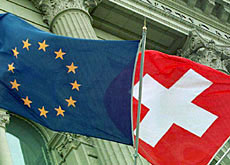
Swiss unimpressed by EU interference

Swiss cabinet ministers have questioned European Union claims that Switzerland’s ties with Brussels could suffer if a nationwide vote in September is rejected.
But Karin Gilland Lutz, a political analyst at Bern University, told swissinfo that the government should not have been surprised by such comments from Brussels.
Benita Ferrero-Waldner, the Austrian-born EU foreign-affairs commissioner, warned on Monday of the consequences if the Swiss refuse to extend an existing treaty on the free movement of people to include the ten new EU member states.
A nationwide ballot on the issue is due to be held on September 25.
Ferrero-Waldner said a “no” in September would spell the end of Switzerland’s bid to join the EU’s passport-free Schengen area and potentially scupper an existing set of bilateral treaties.
Her remarks – which came one day after the Swiss voted in favour of joining Schengen – caused an outcry in Bern.
Foreign Minister Micheline Calmy-Rey expressed “surprise” that Ferrero-Waldner had linked Sunday’s vote on Schengen with the upcoming September ballot, while Justice Minister Christoph Blocher said it was the “first time” he had heard that the issues were connected.
But according to Gilland Lutz, the EU’s position should have been clear to politicians and diplomats – and Ferrero-Waldner’s warning was only to be expected.
swissinfo: Were you surprised by the timing and nature of the comments made by Benita Ferrero-Waldner?
Karin Gilland Lutz: Not really, although I suppose she could have waited a few more days for the Schengen result to sink in here in Switzerland. But what she said is perfectly true: if there isn’t a “yes” vote in September, the consequences for Switzerland could be quite severe in that the EU could cancel the bilateral accords which have already been agreed.
swissinfo: How do you account for the fact that at least two cabinet ministers claimed they were “surprised” by Ferrero-Waldner’s suggestion that Schengen is linked to the vote in September?
K.G.L.: I think they must have been pretending – because if anybody should know they should! I’m not saying they all said to each other beforehand “when this Austrian woman comes out and says what she is going to say we’ll all have to pretend we know nothing about it”. It was probably more that they had to think on their feet and the line about being “surprised” was the best response they could come up with.
swissinfo: So you’re saying their response was more a knee-jerk reaction than a strategic move?
K.G.L.: It’s difficult to know precisely what the strategy behind this pretence was, but I suppose… they didn’t think it was in their interests to admit that the June and September votes are linked or that the consequences of a “no” in September could be severe.
Last Sunday’s vote in favour of joining Schengen was a fairly close call, and there is no question that the vote on the free movement of people accord is going to be even tougher for the “yes” camp.
It may be that the government is thinking that it would not be a good move to play up the importance of the September vote at this stage, since the campaign hasn’t really started.
swissinfo: Can we expect Brussels to wade into the campaign in the run-up to September?
K.G.L.: It’s difficult to know, but I don’t think it would be a very clever move. The Swiss don’t like it when they feel there is outside interference. This has sometimes been a feature of other referendums, for example in Ireland. Whenever an EU commissioner tried to stick his or her nose into European debates there, it never went down well.
So if the European Commission has learnt its lesson, it will keep out of the campaign and let the Swiss decide for themselves. The bottom line is that any interference from Brussels is almost 100 per cent certain to backfire.
swissinfo: Finally, if you had to place a bet on the outcome of the September vote, where would you be putting your money?
K.G.L.: Definitely on the “no” side. It will be incredibly difficult for supporters of the treaty on the free movement of people to win this one, because the [rightwing] Swiss People’s Party is good at playing on people’s fears – and with this vote they have the perfect opportunity to play with fears about unemployment, and this is something many people are worried about right now.
Those in favour of extending the accord on the free movement of people are really going to have to work much harder than they did in the run-up to the Schengen vote if they are to stand any chance of winning in September.
swissinfo-interview: Ramsey Zarifeh
A first set of accords with the EU was signed in 2000.
This was followed by a second package of treaties in 2004.
Last Sunday the Swiss voted in favour of joining Europe’s passport-free Schengen zone, which is one of the elements of the second set of accords.
In September voters will be asked to decide whether Switzerland should extend an existing accord on the free movement of people – agreed in 2000 – to include the ten new EU member states.

In compliance with the JTI standards
More: SWI swissinfo.ch certified by the Journalism Trust Initiative



























You can find an overview of ongoing debates with our journalists here . Please join us!
If you want to start a conversation about a topic raised in this article or want to report factual errors, email us at english@swissinfo.ch.